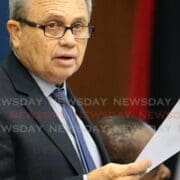Observers Urge Major Reforms To Guyana Elections Commission, Voter List And Campaign Rules
News Americas, GEORGETOWN, Guyana, Weds. Sept. 3, 2025: With nearly all Statements of Poll posted but most of the final tallies still pending from Guyana’s Sept. 1, 2025 vote, three major observer missions on Wednesday praised a peaceful election day and laid out a reform to-do list they say would strengthen confidence before the next national contest.
The Commonwealth Observers group delivering a analysis of the 2025 Guyana elections. (Commonwealth image)
The Carter Center, the Commonwealth Observer Group and the CARICOM Election Observation Mission each urged faster, clearer rules, less politicization at the elections commission and tighter controls on campaign conduct and financing. GECOM’s website shows roughly 98% of SOPs uploaded nationwide. Region 7 remains the laggard all SOPs still to be posted.
Depoliticize and professionalize GECOM.
All three missions flagged the structure and perception of the Guyana Elections Commission as a core risk. The Carter Center said the current formula – three commissioners aligned with the governing party, three with the opposition and a chair chosen from a list acceptable to the president – has produced gridlock and eroded trust. It recommended moving to a more independent, less political model and publishing full written polling and tabulation procedures well ahead of any vote. The Commonwealth team likewise called for a review of GECOM’s composition and urged the immediate appointment of a substantive legal adviser to the body.
Voters wait in line to cast ballots at a polling location during the general election in Leonora, West Demerara, Guyana, on Monday, Sept. 1, 2025. Photographer: Yancey Haywood/Bloomberg via Getty Images
Make tabulation and communication more transparent.
Observers commended GECOM’s new step of publicly uploading SOPs and displaying them during tabulation, but noted delays where staff had to both upload and later re-display the same documents. They recommended streamlining the sequence and improving public guidance on how tabulation works. All three missions encouraged more frequent, consistent briefings and easier access to information for parties, media and citizens to cut space for rumor and misinformation.
Fix the voter list — and publish the census.
The size and integrity of the voters roll dominated stakeholder complaints, the missions said. The Carter Center urged GECOM to fully implement 2022 legal changes that allow removal of deceased voters using official data, and to explore methods for identifying electors who died overseas. It also recommended an independent “people test” sampling of the list before the next election. The Commonwealth and CARICOM teams said releasing results of the 2022 census would bolster transparency around demographics and the roll’s size.
Consider biometric verification.
Both the Commonwealth and CARICOM missions pressed for renewed, early-cycle consideration of voter-identification biometrics to reduce the risk of impersonation and restore confidence, noting GECOM cited technical and legal hurdles this year.
Curb misuse of state resources and modernize campaign finance.
Citing multiple complaints and evidence of blurred lines between state functions and party activity, observers urged clear legal prohibitions and enforcement against the use of public assets in campaigning. The missions also called current campaign-finance rules outdated and largely unenforced, and recommended a comprehensive framework covering donations, disclosure and oversight to level the playing field.
Broaden inclusion — women, persons with disabilities and smaller parties.
Women were highly visible in the process — making up roughly half of registered voters and the great majority of polling staff observed — but missions urged stricter enforcement of the legal requirement that party lists include at least one-third women and asked parties to publish gender data on their slates. All three groups faulted persistent accessibility barriers: many polling places lacked ramps; tactile ballot guides were not provided this cycle; and proxy voting, while available, compromises ballot secrecy for some voters with disabilities. The Commonwealth team recommended extending early voting to other essential workers beyond the disciplined services and offering more support so newer and smaller parties can participate on equal footing.
Strengthen domestic civic oversight and fact-checking.
The missions noted Guyana lacks a well-resourced, nonpartisan domestic observer network capable of nationwide coverage. They urged investment in civil society election monitoring and suggested an independent fact-checking mechanism to counter online misinformation that spiked during the campaign.
Implement recommendations — with deadlines.
Each mission stressed that many of these proposals echo past cycles. They urged the new Parliament to empower the Constitutional Reform Commission and enact priority electoral reforms — including GECOM restructuring, campaign-finance rules, access-to-information guarantees, and media-equity provisions — at least two years before the next vote.
Election day itself drew broad praise, however. The Carter Center said teams visited 234 polling stations across all 10 regions and reported orderly openings, trained staff and party agents present at nearly all locations. The Commonwealth and CARICOM groups observed punctual openings, calm voting and transparent counts, with SOPs signed and posted at polling sites and uploaded for public view.
As tabulation wraps up, the missions urged parties and supporters to remain patient and channel any disputes through the courts. The test ahead, they said, is not only announcing winners but converting a largely smooth election day into lasting confidence through visible, timely reforms.







Leave a Reply
Want to join the discussion?Feel free to contribute!